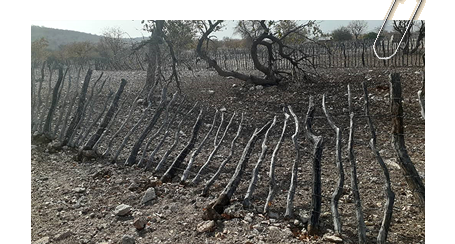Human-elephant conflict management in north-western Namibia
North-western Namibia holds an important population of elephants in an arid to hyper-arid area where people and wildlife compete for scarce resources, often leading to human-wildlife conflict. IRDNC’s Human-Wildlife Support Unit in the region has increased tolerance amongst local farmers and residents towards elephants, as well as lion, but conflicts need to be mitigated to avoid further retaliatory killings. Species-specific rangers, such as Lion Rangers and Rhino Rangers, form teams and have been trained to protect the species in hotspot areas, while Community Game Guards employed by conservancies patrol and monitor all other wildlife species.
There are now more elephants in the northern Kunene Region than in the past 30 years and elephants are recolonizing parts of their former range, especially the central highlands, as the population expands. This is the outcome of a very successful conservation programme overall, but an important and geographically discrete sub-population of elephant is under direct threat.
Poor rainfall over the past seven years has caused a severe drought in parts of the elephant range in the Kunene Region. In such situations, elephants typically move further inland along dry riverbeds for better food, shelter and access to water than the surrounding arid mountain landscape. This brings elephants into contact with people who are not used to them or do not have the means to protect their infrastructure or farming activities. Elephants would also stay longer in such areas than in years of higher rainfall. This situation has created a major threat to the elephants in the region where elephants are at a critically low population level and under imminent threat.
These elephants have become known to the world as Namibia’s iconic desert elephants. To combat the risk that further illegal killing will occur by poaching for ivory, and to prevent further retaliatory killings, a number of interventions are urgently needed. In response, IRDNC launched the Kunene Highland Tourism Project with highland elephants as a main attraction, which incentivises the protection of the species, while further developing tourism routes and facilities to attract tourists to the region for the benefit of low income earning conservancies in the region.
IRDNC is making additional fundraising efforts for elephant-specific monitoring and conflict mitigation. This includes:
- Strengthening community game guards in conservancies within elephant home ranges
- Provide field equipment for game guards and IRDNC staff including binoculars, GPSs and camping equipment
- Provide training to game guards and IRDNC staff to observe and monitor elephant, identify and report wildlife activities and record data
- Procure electric fence to protect community gardens from elephants
- Strengthen logistics support by IRDNC for liaison with conservancies and game guards and do joint routine patrols in elephant concentration and conflict areas.

- Fence damaged by elephants



